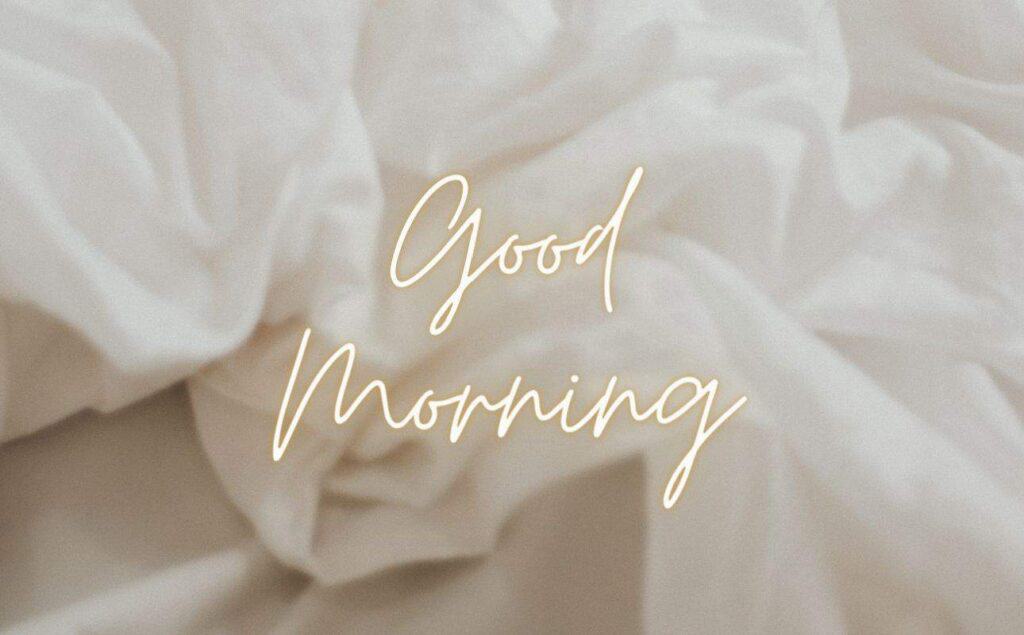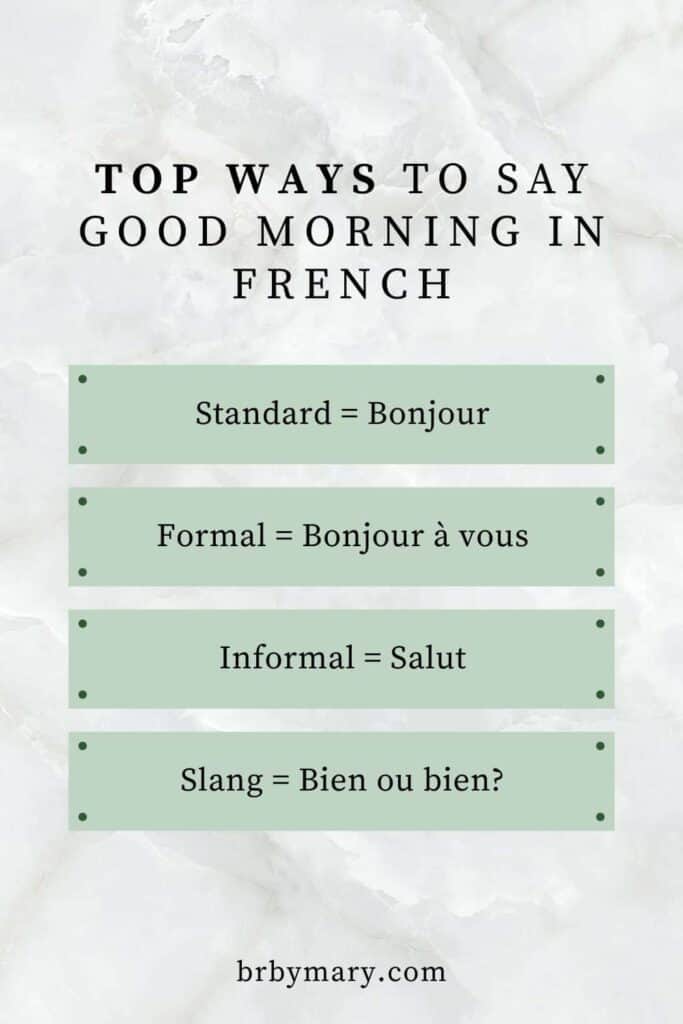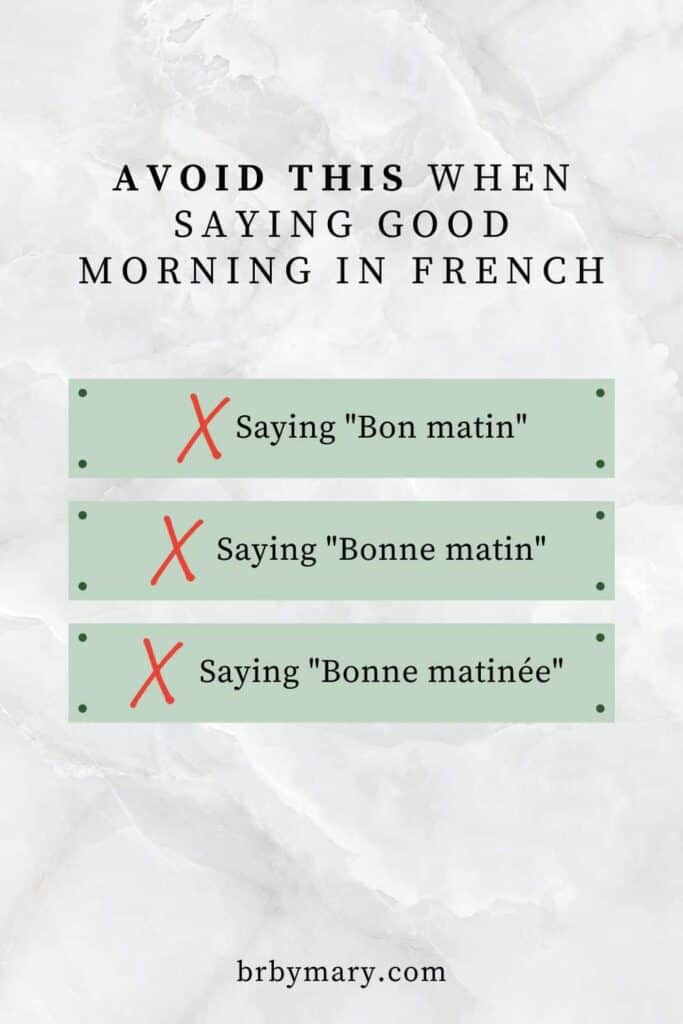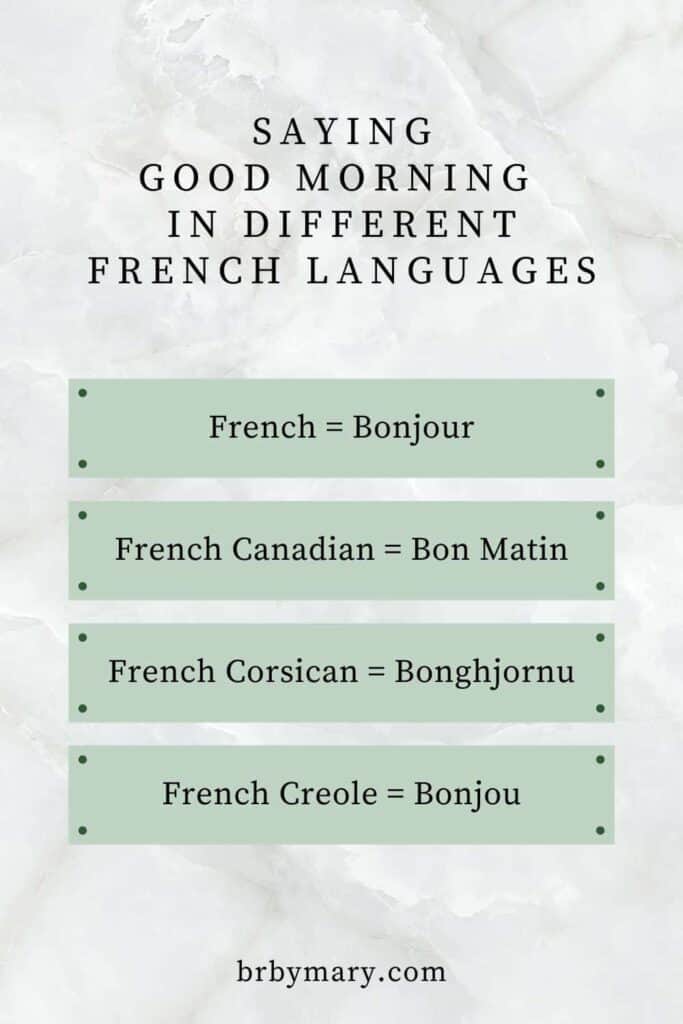49 Ways to Say Good Morning in French: All You Need To Know To Speak Like a Native
Are you looking for the best ways to say good morning in French? You’re in the right place! In this post, we will go over 49 ways to say good morning in French language so you can quickly learn the most commonly used phrases in the country of bread, cheese and Champagne!
Knowing how to say a few words in the language of the country you are visiting is one of our essential travel tips. It allows you to communicate easily with the locals and also be more respectful towards them. It only takes a few minutes to learn how to say hello in different languages or how to say cheers in French. But it makes the biggest difference to the locals who will feel more connected with you when interacting. If you are going to visit France, I highly recommend that your learn French words that are basic, including saying no in French, how to say nice to meet you in French and, of course, good morning.

As you know, I (Marie) am French and though I’ve lived in Dublin and in the USA, I spent the majority of my life in France. For that reason, I can teach you the right French vocabulary to learn how to say good morning the proper way in France.
In this post, you’ll learn the following:
- All the different ways to say good morning in French
- How to pronounce good morning in French
- How do you spell good morning in French
- A variety of French morning greetings
Most common way to say good morning in French
There are a lot of different ways to say good morning en Français. In this section, we will teach you the most common word in French for good morning.
Good morning in French = Bonjour
The most common translation of good morning in French is “Bonjour”. Bonjour is pronounced Bonh-joor. Bonjour is the gathering of the two different French words “Bon”, which means good and “jour” which means day. Bonjour literally translates to good day in English. Though Bonjour doesn’t contain any reference to “morning”, it is the right word to use to say good morning.
When to use Bonjour
Though it does mean good morning, Bonjour can actually be used at any point during the day. you can use it to greet someone who just woke up and it is the equivalent of “hello” or “good afternoon” after 12pm. That said, you cannot use it after 5pm as at that time, we switch to “good evening” which translates to “bonsoir” in French.
How to use Bonjour
Bonjour can only be used once with the same person. If you see that person again later in the day, we would usually just use “salut” (one of the translations for “hello”) or “re-bonjour” which means re-hello. Otherwise, we would use different sentences to make a small comment about how funny it is that we are meeting each other again such as “on se retrouve” (“we find each other again”).
Bonjour vs bonne journée
You might be wondering what the difference is between “Bonjour” and “Bonne journée”. Bonne journée is pronounce Bohn-joor-ney and is the literal translation of good (bonne) day (journée or jour). So literally, “bonne journée” could mean good day. But so does “Bonjour”! Confused yet? Let’s see how you can use “bonne journée”!
To make it simple, “bonne journée” is only used to wish someone a good day or in a sentence talking about having a good day. But you cannot use it to say good morning or hello. For example, the most common way to use “bonne journée” is when saying the equivalent of “have a good day!”. You could also say “J’ai passé une bonne journée” which means “I had a good day”. In contrary, no-one would say “J’ai passé un Bonjour” as it would mean “I spent a hello”.
Why we don’t use Bon matin to say good morning in French
You might be wondering why French people don’t use “Bon matin” to say good morning. In this section, we explain why “bon matin” isn’t used in the French language.
Bon matin meaning
Now, you might be wondering why there isn’t a literal translation of good morning in the French culture. The French for morning is “matin”. The literal translation of “good morning” in French is “bon matin”. However, no-one uses “bon matin” to say good morning. It is not one of the French greetings to say good morning and though a French person could understand you if you said it, it really wouldn’t be natural to use it in that sense. Please also note, that, even though I’ve seen it written in other posts, “bonne matin” is grammatically wrong.
Bon matin in English
Though bon matin isn’t used in French, it is used in English. If you, like us, are around people who speak different languages or live in an English-speaking country, you would have notice that sometimes, people use the literal translations of English phrases even when it doesn’t technically exist in the language. That is the case for good morning too.
I have noticed that the French community abroad has a tendency to use “bon matin”, especially in writing on social media, to say good morning. Though one could argue that it is more self-explanatory than a generic Bonjour, it still is incorrect to use bon matin. If you do use it, French people will notice right away that you are not a native speaker!
It seems that it is also the case that French-Canadian people (mostly in Quebec) use “bon matin” to greet others in the morning, probably due to the proximity with the English language. This is a newer phenomenon that has been qualified of “incorrect” by the Office Québécois de la langue Française (OQLF).
When to use bon matin
As you’ve seen, you cannot use bon matin to say good morning. However, you can use it in different sentences. For example, if you want to say “I had a good morning”, you would say “J’ai passé un bon matin” or “J’ai passé une bonne matinée”.
You could also wish someone to spend a good morning and in that case you would say “Passe un bon matin” or “Passe une bonne matinée”.

Different ways to say good morning in French depending on the person
Now that we have seen how to say good morning in French, let’s see how that changes depending on who you are talking to. In this section we cover how to say good morning sir in French, good morning in French to a woman, how to say good morning my love in French
Good morning to you in French = Bonjour à toi
“Bonjour à vous” is a more formal way to use this phrase as well.
Hi good morning in French = Bonjour
You will notice that in this case, “hi” and “good morning” translate to the same French word so there is no need to repeat it twice.
How do you say good morning sir in French = Bonjour monsieur
Bonjour monsieur is the way to say good morning in French to a man that you just met. If you want to emphasise the level of respect you have for someone, you can use Bonjour Monsieur with a capital M. This is usually used when addressing a professor at university or someone you admire. Monsieur with a capital M emphasises respect to the person.
Good morning madam in French = Bonjour madame
The same applies to madame and Madame. If you say Bonjour Madame, it means a certain level of respect and also works when addressing a professor.
What is good morning my love in French = Bonjour mon amour
Another way to say in French good morning my love is “Bonjour mon adoré/e”. Though “mon amour” is more common, “mon adoré/e” also works. Another Good morning my love French translation is “Bonjour mon amoureux” for a men or “Bonjour mon amoureuse” for a woman.
Good morning love in French = Bonjour Amour
In this case, “Amour” is used more as a noun or a nickname for the person and is also the translation for good morning lover in French.
Good morning handsome in French = Bonjour beau gosse
This one definitely needs a bit more explanation. The literal translation of “good morning handsome” is “Bonjour beauté” but it doesn’t really work in French because “beauté” is usually used for a woman. The good news is that there are several ways to translate that expression.
If you are wondering how do you say good morning beautiful in French for a man “Bonjour beau gosse” is the answer. “Gosse” usually means “kid” in French slang but when added to “beau”, it means handsome.
Another way to translate good morning handsome is to refer to the hair colour of the man in question. For example, if the man has dark hair (brown or black), you could say “bonjour beau brun”, “brun” referring to the brown color”. If the man has blond hair, you could say “bonjour beau blond”.
How to say good morning beautiful in French for a woman = Bonjour beauté
You can also say “Bonjour ma belle” or “Bonjour ma beauté”.
Good morning baby in French = Bonjour bébé
Bébé is, just like in English, a nickname for your sweetheart and is used for babe or baby. Note that it’s often considered a bit kitsch but hey, love makes you silly sometimes!
Good morning my darling in French = Bonjour mon chéri (for a man) / ma chérie (for a woman)
Another translation for Good morning my darling is Bonjour mon cher (for a man) or ma chère (for a woman. However, note that cher and chère are more formal and chéri and chérie are more cute and familiar.
Good morning princess in French = Bonjour princesse
Good morning sweetheart in French = Bonjour petit coeur/ Bonjour mon petit coeur
Good morning my heart = Bonjour mon coeur
Good morning beautiful lady in French = Bonjour belle demoiselle
Though this is the right translation, I’d like to warn anyone that plans on using this expression that it is rarely well received on the female side. “Bonjour belle demoiselle” can be interpreted as coming from someone annoying and pushy and is often associated with guys on the street not taking no for an answer. It’s probably best to steer away from that one and used something a bit more formal unless you know the person and are in a steady relationship with them.
Good morning sexy in French = Bonjour la plus sexy /Bonjour le plus sexy
Calling someone sexy as a noun doesn’t really work in French. We wouldn’t generally say “Bonjour sexy”. However, you could use Bonjour la plus sexy /Bonjour le plus sexy which translate to Good morning to the sexiest.
Good morning honey in French = Bonjour chéri/chérie
Good morning sugar = Bonjour mon petit sucre/Bonjour mon sucre
Note that adding “petit” is a way to make it sound even cuter.
Good morning my dear friend in French = Bonjour mon cher ami/ Bonjour ma chère amie
You could also say Bonjour cher ami/chère amie.
Good morning my little darling = Bonjour ma petite chérie/ Bonjour mon petit chéri
This can be used in a lot of different situations. It can be used to greet essentially anyone you love from your pet to your nephew. We would usually use it to greet someone younger than us so you wouldn’t use it to greet your grandma.
Good morning you = Salut toi or Bonjour toi
How do you say good morning my friend in French = Bonjour mon ami/ Bonjour mon amie
How to say good morning everyone in French = Bonjour à tous (for men or men and women)/ Bonjour à toutes (if the group is only made of women)
Good morning Paris in French = Bonjour Paris
Good morning people in French = Bonjour les gens
Good morning to all in French = Bonjour à tout le monde
This also works to translate Good morning everybody in French.
Good morning I love you in French = Bonjour Je t’aime
Good morning mum = Bonjour maman
Good morning dad = Bonjour papa
Good morning child/my child = Bonjour mon enfant/ Bonjour mon gamin
Formal ways to say good morning in French
Though Bonjour is the French of good morning, there are a couple expressions you should know to translate good morning into French the formal way:
- Very good morning in French = Bien le Bonjour
- Good morning my dear in French = Bonjour ma chère/mon cher
- Good morning sir/madam = Bonjour Monsieur/Madame (especially used to address a professor, a lawyer or anyone you respect in a formal way)
You would generally use those expressions with people you know and respect but are not close to like you would be with family and friends. This can be a professor, a lawyer, a group of people you are teaching, or someone very special to you.
Informal ways to say good morning in French
As you will have understood, bonjour is the standard way to say good morning and can be used in both formal and informal situations. In this section, we are focusing on more informal ways to say good morning that are different from “bonjour”. You can use those words with friends and family. We wouldn’t, however, use those outside of that circle. For example, it wouldn’t make sense using any of those when entering a bakery or when greeting someone you don’t know.
Salut
Salut is probably the most common way to say good morning to friends. It can be used from morning to evening and several times during the day. It is pronounced Sah-Lhu. Salut can also be used to greet someone who is leaving or when you are leaving yourself.
Coucou
Coucou, pronounced “kookoo”, is often used orally and in writing. It is usually used when you are trying to be cuter when greeting someone. It is a cheerful way to greet someone. Contrary to Salut, it cannot be used when leaving. Coucou is also the equivalent of “peak-a-boo” when playing with a child.
Hello
This might come as a surprise but we do use the word “hello” pretty commonly in France. We pronounce it “ay-low”. We use it when meeting with friends or family or when seeing someone we know on the street to start a chat.
Allo
The French language is complex and includes some older languages like the “Platt”. These languages usually originate from German from times when Germans occupied French territories. In some parts of France, these languages are still spoken as a second language. In that context “Allo”, which is originally the German way to say hello, can be used to greet someone in the morning.
Hey
Just like in English, we sometimes use “hey” to greet someone in the morning or during the day. It’s not very common but it happens.

What’s good morning in French slang
If you are traveling or moving to France and want to sound like a French native, you’ll need to know what good morning translated to French slang is!
Note that we would usually only use those with close friends and not with family. These expressions are slang phrases and almost street style. To be fair, we use these mostly as a bit of a joke or to give ourselves some kind of street style. You can use any of these at any time of the day, including to say good morning.
Bien ou bien?
“Bien ou bien?” translates to “good or good?” and is a shorter way to ask if someone is good. Guys like to use that one with their buddies especially.
Hey poto
“Poto” is another way to say “mon pote” which is the equivalent of bud’ or buddy. So “Hey poto” literally translates to “Hey bud/hey buddy”. For that reason, you would usually only use that expression with your very close friends. “Poto” is pronounced powtow and “mon pote” is pronounce monh-pawt
Salut mon pote
Mixing “Salut” with “mon pote”, this expression is another way to say good morning to one of your buddies.
Questions that mean good morning in French
If you’ve read the post up to know, you will have learned more than one good morning in French translation. However, there are other ways to translate good morning to French than literally.
One way, other than bonjour, to say good morning in French is to ask a question. Whether that’d be on how you slept or how you are doing, asking a question is a common way to greet someone at the beginning of the day. Let’s see what these good morning French language questions are in the following sections.
Ça va?
One way to indirectly say good morning in French is to ask “Ça va?” which means “how is it going?”. A common way to say this phrase is to do “la bise” which means kiss the person on the cheek and ask “Ça va?” at the same time.
Tu vas bien/Vous allez bien?
“Tu vas bien/Vous allez bien?” translate to “how are you”. “Tu” is the informal way to ask while the use of “vous” marks the formal way to ask the person. In the same way as “Ça va?”, we use “Tu vas bien/Vous allez bien?” as a way to say good morning while kissing on the cheeks or when meeting someone on the street for example.
Bien dormi?
“Bien dormi?” literally translates to “slept good?” and is a way to ask someone if they had a good night. By asking that, you imply that you hope the person did have a good night and therefore that it is a good morning.
Tu as passé une bonne nuit?
This phrase is just a longer way to ask someone if they had a good night. The logic is the same as “Bien dormi?”.
Tu as fait de beau rêve?
“Tu as fait de beau rêve?” is a phrase used to ask someone if they had nice dreams. When asking this, you hope that they did and therefore had a good sleep which then leads to a good morning.
Good morning in French Corsican
If you’re looking to visit Corsica and its stunning beaches, you will need to know that Corsican people, although their first language is French, also speak a local language, Corsican. To translate good morning in French Corsican, you need to say “Bonghjornu”. Corsican is very similar to Italian. In this case, Bonghjornu (Corsican) is pronounced the same as Buongiorno (Italian) and that is Bohn-joor-no. Many Americans often confuse Buongiorno with Bonjour so if that’s you, you can relax knowing that in Corsica you’ll be right!
Just like in French, Corsican also ask “how are you” to greet someone in the morning. In Corsican, you’ll say “Cumu và ? / Cumu state ?”.
How do you say good morning in French Canadian
Technically, good morning in French Canadian translates to the same as in metropolitan French and that is “bonjour”. However, as I explained above, French Canadians have started to use “bon matin” in the recent years. “Bon matin” is the literal translation of “good morning” and isn’t typically used in French. The Quebec Office for the French Language has stated that “bon matin” is incorrect and that “bonjour” is the right translation to use. Note that the French Canadians also usually speak English so they do use “hello” or “hi” in a lot of cases.
How to say good morning in French creole
Good morning in cajun French is “Bonjou” and is pronounced the same as Bonjour but without the r sound at the end. You could also say “Sa ou fè ?” which means “how are you” to greet someone in the morning. “Sa ou fè ?” is pronounced Sah-oo-fey.
What to say after good morning in France
Whether you are looking for how to respond to good morning in French or what to say after good morning, this section will provide you with some vocabulary you can easily used to sound like a native speaker!
What to say after good morning in French when you initiate the greetings
As we’ve seen above, if you are the person saying good morning to someone else, you can add a word in relation to the person you are talking to such as “my love”, “sir”, or “my friend”.
What to say after good morning in French when you respond to the greetings
In addition, if someone says good morning to you, you will need to know how to respond. Here are the most common phrases you can use to respond to someone greeting you in the morning in French:
- Good morning how are you in French = Bonjour, comment ça va?
“Bonjour, comment ça va?” can be used to respond to someone greeting you in the morning. When someone tells you good morning, you can reply with bonjour and asking them how they are doing.
- Good morning and have a nice day in French = Bonjour et bonne journée!
When someone greets you in the morning and you just want to respond without engaging the conversation (you might be pressed by time), you can answer by saying good morning and have a great day which is “Bonjour et bonne journée!”
What to say after good morning in French when you leave
After greeting another person with bonjour and exchanging conversation, you will likely have to leave. In that context, you will want to use one of the following expressions:
- How to say have a good day in French = Passe une bonne journée!
There are several ways how do you say good day in French. One way how to say good day in French is “Passe une bonne journée!” but you can also say “Je te souhaite une bonne journée” which means “I wish you a good day” if you’re talking to someone you know. Otherwise, “bonne journée” can be enough, especially if you are addressing someone you don’t really know like the baker or the cashier at a store.
- Have a good morning in French = Bonne matinée!
If you want to specifically wish a good morning to someone, you can say “Bonne matinée!”. This is pronounced Bohn-mah-tee-ney.
What to say after good morning in French later in the day
- Good evening in French = Bonsoir (Bonh-swar)
- Good afternoon in French = Bonne après midi (bohn-ha-prey-mee-dee)
- Good night = Bonne nuit (bohn-noowee)
- Saying goodbye = Bye/ Au devoir (oh-reu-vwar)
French word for morning and other morning vocabulary
In this section, we included some further vocabulary related to the morning so you can improve on your French.
- This morning in French = ce matin
- What is morning in French? = le matin
- Beautiful morning in French = un beau matin or une belle matinée
- Sunday morning in French = Dimanche matin
- Early morning in French = tôt le matin
- Early in the morning in French = tôt dans la matinée
- In the morning French = dans la matinée
- To know how to say in the morning in French, you will need to remember to say “dans la matinée” and not “dans le matin”.
- Every morning in French = tous les matins
- Tomorrow morning in French = demain matin
When can you say good morning in France
If you come from an English speaking country or any country where you can translate good morning literally, you probably are aware that “good morning” can only be used in the morning, more or less until lunch time.
In this post, we covered that in French, we do not use “bon matin” to say good morning but “bonjour”. “Bonjour”, one top of being a morning greeting in French, is also one of the ways to say “hello” in French. The consequence is that “bonjour” can be used throughout the day, all the way until night time.
Good morning in other languages
Though it’s important to know how to say “good morning” if you travel to or live in France, it’s also important to know how to say “good morning” in other European languages. Indeed, France shares its borders with a number of other EU countries that you can travel to very easily from the country of Champagne!
- Good morning in Italian = Buongiorno (pronounced Bwon-g-owr-no)
- Good morning in Luxembourgish = Moiën (pronounced Mow-yeun)
- Good morning in Portuguese = Bom dia (pronounced Bohm-deeya)
- Good morning in German = Guten Morgen (pronounced Goot-an-mowr-gun)
- Good morning in Spanish = Buenos días (pronounced Boo-anos-dee-yas)

How can I say good morning in French Q&As
After reading this article on the French good morning Bonjour expression, we thought you would like to have access to a quick Q&As on saying good morning in French.
What is good morning in French?
Good morning translates to Bonjour in French.
How to tell good morning in French?
If you are wondering how to speak good morning in French, you have to say “bon” with the same “on” sound as in “long”, and “jour” which is pronounced like “joor”.
How to write good morning in French language?
Good morning in French is spelt B-O-N-J-O-U-R.
Is Bonjour good morning in French? Yes
Is Bonjour only for the morning? No, Bonjour can be used throughout the day as it also means “hello”.
What is bon matin?
“Bon matin” is the literal meaning of good morning in French but isn’t used to say good morning.
How to reply to good morning in French?
To reply to “bonjour” in French, you can simply say “bonjour” in return or one of the following:
- Bonjour à toi aussi = Good morning to you too (informal)
- Bonjour à vous aussi = Good morning to you too (formal)
- Comment ça va? = How are you
What are 3 greetings in French?
If you had to remember three French greetings, I would recommend to know these ones:
- “Bonjour” is the equivalent of “good morning” or “hello”.
- “Bonsoir” is an evening greeting.
- “Salut” is used to greet friends at any time of the day.
– SAVE THIS POST –
Any questions on how to say good morning in French? Drop them in the comments or on insta @twolostexplorers and I will get back to you asap.
Did you like this post? If you liked this post, don’t hesitate to share it by using the share buttons on the side.
Want to save this post? You can pin the following images on Pinterest to save this post.
We are Mary and Eric, the founders of Be Right Back, a blog dedicated to romance around the globe and at home.
We are Mary and Eric, the founders of Be Right Back, a blog dedicated to romance around the globe and at home. With over 10 years of experience in dating and traveling to romantic places, we share our favorite date ideas and romantic destinations to help couples level up their relationships. Having lived in and traveled through the USA, we also share our favourite things to do in the States.
With 70,000 monthly readers and 16,000 followers on social media, Be Right Back is your go-to resource for romantic trip ideas and couple activities at home and abroad.
